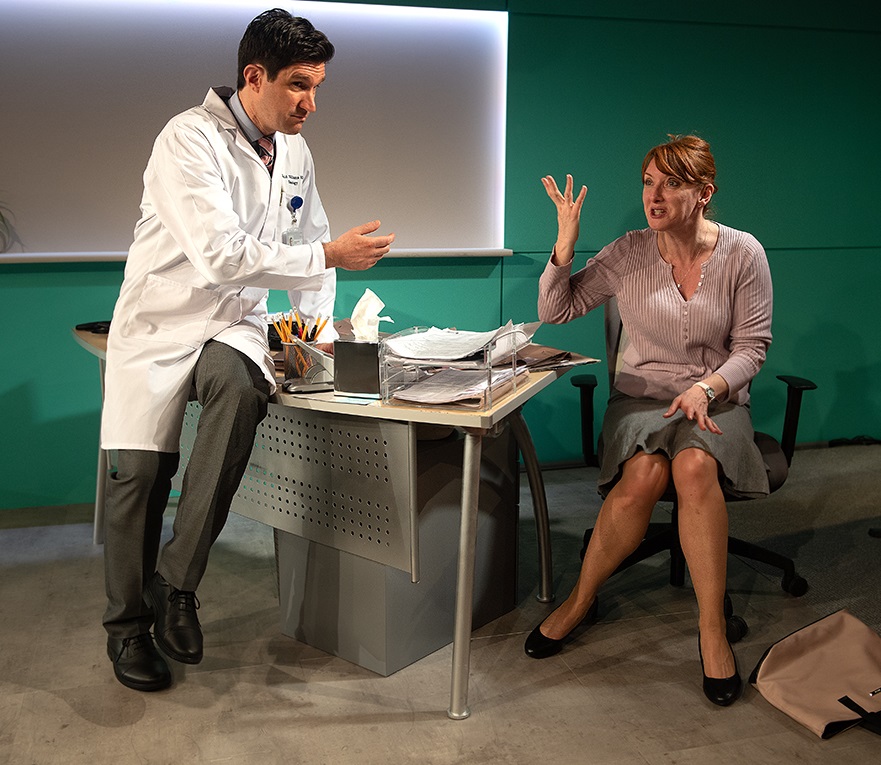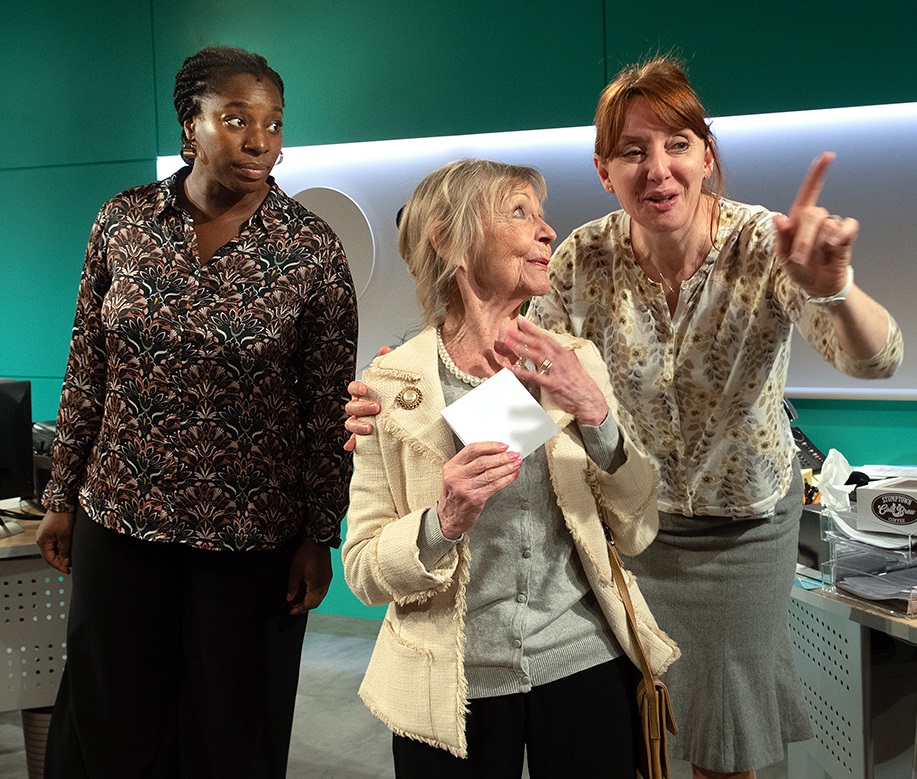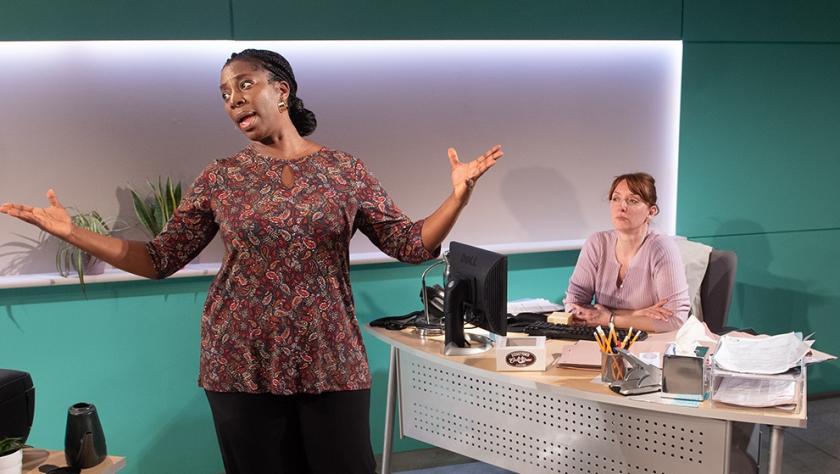Conflict and comedy can be unpredictable bedfellows, and Chicago playwright Joel Drake Johnson’s 2014 play occasionally risks overstretching itself in its attempts to reconcile the two – although its immediate context, the world of office politics, has a rich history of showing humanity at its worst, and such ghastliness can be painfully funny. At the same time Johnson explores a much more profound strand of social unease, the echt-American issue that is racism, the depths and ramifications of which sometimes sit uneasily with some of the surrounding elements of Rasheeda Speaking.
But if there’s contradiction there, it’s swept away by a rollercoaster performance from Tanya Moodie as Jaclyn (or Jackie, the nuances of workplace informality being very much part of Johnson’s subject), who plays an office assistant to a Chicago hospital surgeon. She works in tandem with the older Ileen, who’s almost her exact opposite: where Moodie’s character is uninhibited – even when a degree of restraint would be appropriate, avoiding outright rudeness – Elizabeth Berrington’s Ileen is non-confrontational, mousey even, and easily perturbed. Rasheeda Speaking revolves around the uneasy dynamics of their interaction.
 The play’s opening confab between Ileen and David (Bo Poraj, pictured right with Elizabeth Berrington), her surgeon boss, indicates that change at this workplace is imminent. The latter, all smarmy aggression, is clear that Jaclyn doesn’t “fit in”, that he wants her “transferred”, and sets his loyal, long-serving underling the task of recording “observations” for an HR case. All such terms are little more than euphemisms for David’s tacit racism, although both know, and acknowledge, that the “race card” is something they have to avoid at all costs.
The play’s opening confab between Ileen and David (Bo Poraj, pictured right with Elizabeth Berrington), her surgeon boss, indicates that change at this workplace is imminent. The latter, all smarmy aggression, is clear that Jaclyn doesn’t “fit in”, that he wants her “transferred”, and sets his loyal, long-serving underling the task of recording “observations” for an HR case. All such terms are little more than euphemisms for David’s tacit racism, although both know, and acknowledge, that the “race card” is something they have to avoid at all costs.
That’s when Moodie’s Jaclyn blows into the room. She’s returning from a medical absence that her doctor has linked to toxins in the environment – as true a diagnosis as there could be, in every sense – although anxiety attacks have also been mentioned. The trajectory of behaviour from all concerned is set to head remorselessly downwards.
The ability to be nasty to people is a human characteristic shared by all
There’s a dilemma for viewers that relates to Ileen especially, as Berrington gamely attempts to hold her own against the verbal onslaughts coming from her colleague. Faced with Jaclyn’s endless “yammering”, any response is difficult, though passive aggression certainly features somewhere in Ileen’s forced correctness. But have the two women ever had any greater degree of closeness, or even just easy office familiarity in the past, one now being lost in the new climate of suspicion that has appeared on the scene?
It’s dramatically problematic too, since Moodie’s behaviour is occasionally so pronounced that we wonder how she has even lasted the six months she has been in the job. The snapping, inhuman abruptness with which she treats an elderly patient, Rose (Sheila Reid, pictured below, centre), who is the play's fourth character would surely have earned her censure before. (The idea for the play came to Johnson after he had something of a similar experience on a hospital visit.)
 It doesn’t help that Rose’s gut response reverts squarely to the race issue: for her, it’s all part of “your culture”, the black experience, “something about your way to get revenge for slavery”. That may be one extreme on the racism equation, but the issue is blurred further by Jaclyn’s attitude to her Latino neighbours, as one-sidedly dismissive as anything that she has experienced herself. If the writer suggests anything, it’s that the ability to be nasty to people is a human characteristic shared by all, the main difference being how adeptly you put it into practice.
It doesn’t help that Rose’s gut response reverts squarely to the race issue: for her, it’s all part of “your culture”, the black experience, “something about your way to get revenge for slavery”. That may be one extreme on the racism equation, but the issue is blurred further by Jaclyn’s attitude to her Latino neighbours, as one-sidedly dismissive as anything that she has experienced herself. If the writer suggests anything, it’s that the ability to be nasty to people is a human characteristic shared by all, the main difference being how adeptly you put it into practice.
Johnson holds back revealing the significance of his title until a searing late monologue that takes the play’s perspective on racism to another level altogether. (Paradoxically, it may pose another question – whether how we receive that speech depends on what we know of Johnson’s own background). The fact that we learn more about his two main characters from their monologues than through the accrued details of their interaction makes for a certain unevenness, a sense that issues are being aired rather than drama developed. Jonathan O’Boyle’s tight production is a sharp 90-minute whiplash of uneasy cultural crossover, one that makes Rasheeda Speaking’s dark comedy both bracing and very funny. The whole may finally be rather less than the sum of its parts, but the sheer pizzazz of Tanya Moodie’s performance certainly stays in the memory.















Add comment